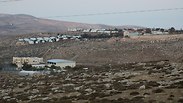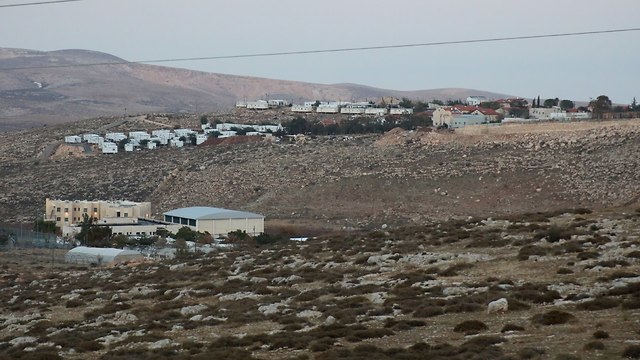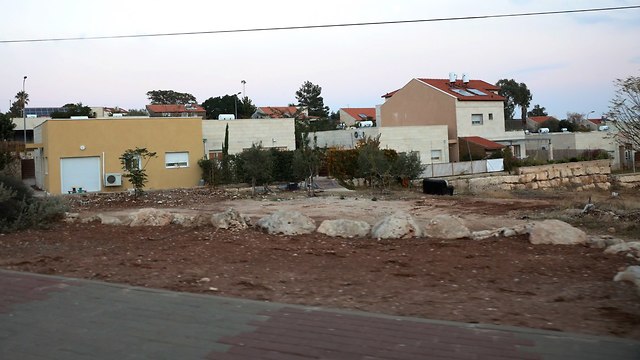
Legal precedent opens door to outpost legalization in West Bank
District court rules in favor of Mitzpe Kramim, ordering legalization of outpost on the basis of a legal concept applied for the first time in the West Bank; possible outcome of this precedent: Israelis who settled on Palestinian-owned lands under government approval will not be evacuated.
This precedential ruling applied the market overt legal concept, a Medieval rule that regulates the status of stolen property, in case some conditions apply. This is the first time market overt was applied in the West Bank, and has the potential to allow the legalization of dozens of outposts built on private Palestinian property in the disputed territories.
The market overt concept determines that “any deal made in good faith between authorities and an individual, regarding a property that authorities thought to be governmental property at the time, will remain valid even if proven the property was not actually at the possesion of the government.”
In this case, people who settled on Palestinian-owned lands under government approval—cannot be evacuated despite the fact that the deal was faulty.
Until recently, the state objected the legalization of outposts built on private property. However, after Justice Minister Ayelet Shaked pressured to change this position, Attorney General Avichai Mandelblit proposed to apply the market overt concept on the West Bank, and the court accepted the plea.
Judge Arnon Darel of the Jerusalem District Court ordered that the residents of Mitzpe Kramim are not to be evacuated, but rather compensated, and that the outpost be legalized.
Mitzpe Kramim was established in the late 1990s, and some dozens of families reside in it. The outpost was originally built near Maaleh Rehavam in Gush Etzion, but was moved to its current location on land allocated by the Settlement Division after a 1999 deal.
However, in 2011, Palestinians residents petitioned to the High Court of Justice and claimed they were the legal owners of the land, which was seized using a military order, and thus the outpost was not legal.
In response to the Palestinian petition, Mitzpe Kramim’s residents filed a suit against the Settlement Division, the Civil Administration and the Palestinian plaintiffs and claimed they had settled there in good faith. They were represented by lawyer Harel Arnon, who also represented the the state’s interests in the West Bank Settlement Regulation Law case.
The High Court of Justice case is still open, as judges were waiting on the verdict on the Mitzpe Kramim suit, and will now resume deliberations on the matter.
Justice Minister Shaked praised the court’s ruling, saying, “the district court stated loud and clear, that whoever settled in good faith and under state approval will not be evacuated. The injustice of the evacuation of Amona and Netiv Ha'avot should not be repeated. The court should not be a part of political debates between Left and Right.”
“Our intensive cooperation changed the way the state responds to the High Court of Justice, a change that we can now see trickling down in this district court ruling,” Shaked continued.
The Regavim pro-settler Israeli NGO, who initiated the Settlement Regulation Law, also praised the court’s ruling. “This is a product of a long legal battle, run by the settlements and settling bodies. They asked to legalize outposts that were established by the State of Israel. This blessed decision is a historic one,” the NGO said.
“We call upon the attorney general to apply the principles of this decision to all other outposts in Judea and Samaria that need regularization,” the Regavim statement continued.
The residents of Mitzpe Kramim also praised the decision, saying that: “We are happy to announce this win in court, in our battle for our home. We thank the Israeli government and especially Justice Minister Ayelet Shaked and Education Minister Naftali Bennett, who after a long road helped us get the desired result.”
Asked about the decision, Nabil Abu Rdainah, a spokesman for Palestinian President Mahmoud Abbas, said all of the settlements that Israel has built on disputed land are illegal.
"Peace can't be achieved as settlement continues," he said.
Peace Now, which monitors and opposes Jewish settlement on disputed land, said the outpost's fate would ultimately be up to the Supreme Court, where a petition by the Palestinian property owners is still pending.
The Supreme Court has consistently upheld Palestinian property rights in such cases, leading to the forced evacuation of some outposts.
Peace Now said the "granting of property rights to criminals who settled in an illegal outpost ... without permits, on private Palestinian land is outrageous."
It noted that Israel's right-wing government, which originally had opposed the settlers' land claim, later supported their position in what the organization called an attempt to implement a controversial law on unauthorized settlement.
The legislation, passed by the Knesset in 2017, enables the retroactive legalization of 4,000 settler homes built on privately-owned Palestinian land but is currently under review by the Supreme Court.
Some 500,000 Israelis live in the West Bank and east Jerusalem, areas that are also home to more than 2.6 million Palestinians. Palestinians say settlements could deny them a viable and contiguous state.












